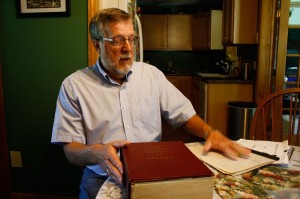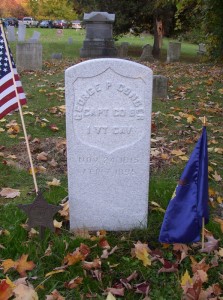Civil War captain played Key role in St. Albans Raid
GEORGIA — For the past few years, the St. Albans area has been gearing up for the 150th anniversary of its most famous — or infamous, depending on how one looks at it — historical event.
In September 2014, many of these same historical enthusiasts, re-enactors and St. Albans residents will commemorate the 150th anniversary of the St. Albans Raid, the northernmost land engagement of the Civil War.
Among the honored guests next year will be none other than Colin Conger, of Georgia, a history buff, to say the least, and someone with a deeply personal connection to the raid and the Civil War.
Conger’s great-great-great grandfather was Captain George Parker Conger, who was one of the main players in the St. Albans Raid.
“Bring your guns and fight.”
– Capt. George Conger, Oct. 19, 1864
Captain Conger was elected as a second lieutenant in the Vermont Militia in 1856, where he joined the “Ransom Guard,” along with Gen. George Stannard, a Vermont military hero who achieved fame throughout the Civil War and most notably in the Battle of Gettysburg.
In 1861, Conger raised Company B, First Vermont Cavalry and he was commissioned as captain. He went on to fight in the battles at Bull Run and at Culpepper Court House. A year later, Conger completed his service and returned to his native St. Albans to care for his wife, who had taken ill.
Gearing up toward the end of the Civil War, the Confederacy became desperate, particularly for money to fund their weakened war efforts. A Confederate officer, Lt. Bennett Young, devised a plan to rob the local banks and burn the town.
On Oct. 19, 1864, Young and about 20 Confederate soldiers, who had been staying in disguise at local hotels, struck.
Capt. Conger, at the ripe age of 49, and who thought he had left the Civil War behind him, was momentarily captured by the raiders. After a brief struggle, he escaped and made his way to the American House on the corner of Lake and Main streets.
“It’s a raid. Bring your guns and fight,” Capt. Conger was recorded as telling his fellow citizens.
Conger reportedly had a chance to shoot Young when he ran back out to the Taylor Park area where the raiders were causing mayhem. According to Conger family records, the captain pulled the trigger three times, hearing a blank click with each pull, which spared Young’s life.
The raiders rode out of town, firing their guns back at their pursuers, having secured more than $200,000 (millions in today’s money) from the banks they robbed.
Capt. Conger led a posse of 50 men, including his 16-year-old son, Stephen, to chase the men up to the Canada border.
Once at the border, Conger convinced 20 of his men to continue into Canada, where eventually they captured most of the raiders and turned them over to Canadian and British authorities.
In the aftermath, Canadian and U.S. lawyers battled over extradition of the raiders, which ultimately never happened.
For many, Conger was considered the hero of St. Albans during the raid. Shortly after defending St. Albans from the small-scale Confederate attack, he relocated to Georgia and founded the Conger family farm on the corner of what is now Route 7 and Conger Road.
Colin Conger said the captain became what he believed was Georgia’s first fish and game warden. He also held several public offices.
Capt. Conger worked the farm with his family until his death in 1895. He was buried at Greenwood Cemetery in St. Albans, along with many of his fellow Civil War veterans. The farm continued to run under Stephen Conger, who had five sons of his own.
Colin Conger said most of the Congers in the Georgia area today are direct descendants of the captain.
A lot of the family history discovered by Colin Conger was found in the handwritten notes of his relative, Maureen Barton, a schoolteacher in the 1960s who kept an extensive record of the Conger family.
From those notes and other pieces of family history, Conger said he’s discovered a few inaccuracies in what was once considered common knowledge about Capt. Conger. For one, Colin said, the captain was born in St. Albans, not Georgia as many assume.
Safely stored in a secured location, Colin Conger has a vast collection of his family’s artifacts. Capt. Conger’s Bible is a large tome, much larger than typical Bibles seen today. One of the most prized possessions is the captain’s rifle, which Colin stores in a maple case he made from a tree that fell in his yard.
While Colin Conger’s family was given the rifle, handed down from generations of Conger men, the captain’s prized sword went another way and its whereabouts is unknown to him.
The sword, a gift from Capt. Conger’s soldiers, was supposed to be in the possession of the Vermont Historical Society in Barre, but a check there found that was not the case. Colin Conger is on the search, stressing he’s not claiming the sword for himself, but he would just like to know that it’s in good hands.
“Things went in different directions,” Colin Conger said of family historical items.
Colin Conger finds pieces of his family history just about everywhere, he said. In 1987, his wife started going to the Georgia Plains Baptist Church. Eventually he went along, and sitting toward the back in pew 21, Colin noticed something interesting.
The Georgia Plains Baptist Church isn’t unique when it comes to pews being bought by particular families or individuals. Whether it was destiny or pure coincidence, the pew the present-day Congers were sitting in belonged to none other than Capt. George P. Conger.
Today, Colin Conger spends his time curating his lifelong love of history, a trait passed down, along with the captain’s rifle, from his father. Writing his own comprehensive account of the Conger family history, Colin urged his relatives to get in touch with him to share any artifacts or information.
“I’m always learning,” he said. “If there are any Congers who haven’t spoken to me yet, I’d love to hear from them.”
By IAN LORD
Messenger Staff Writer
This article is used with the permission of the St. Albans Messenger.





